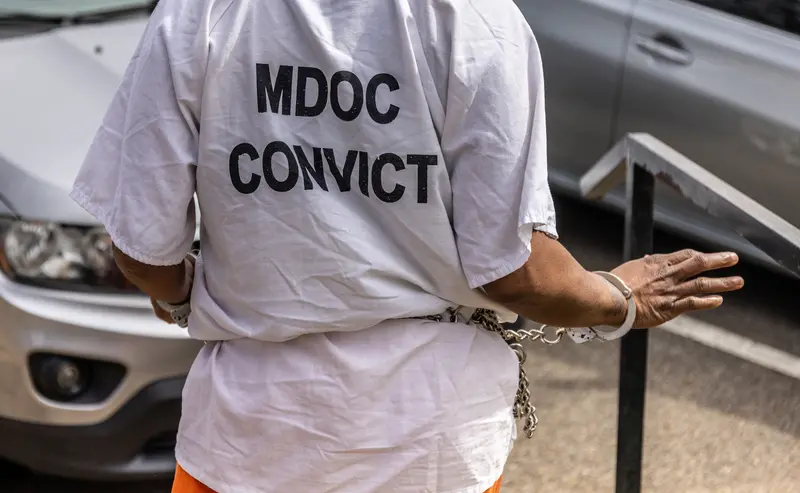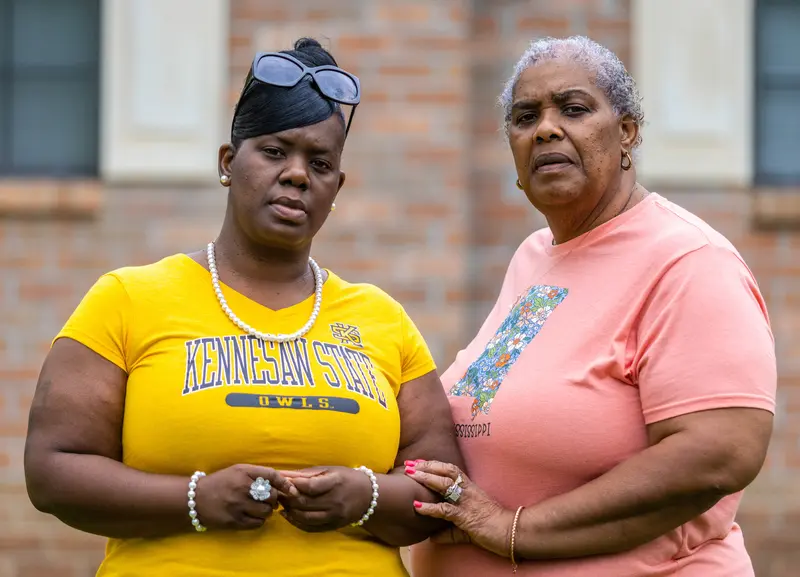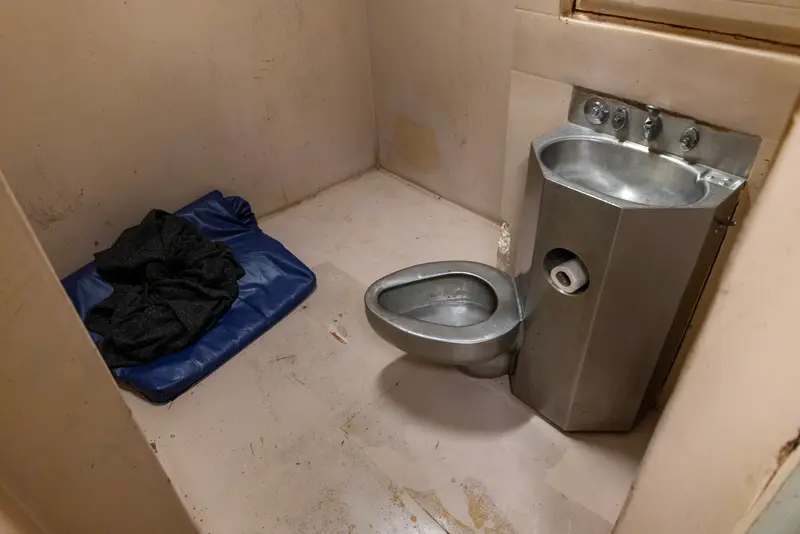This article was produced in partnership with Mississippi Today, which was a member of ProPublica’s Local Reporting Network in 2023. Sign up for Dispatches to get stories like this one as soon as they are published.
5 Takeaways From Our Investigation Into How Mississippi Counties Jail People for Mental Illness
A record number of women were elected to statehouses last year. But in the Southeast, where some legislatures are more than 80% male, representation is lagging as lawmakers pass bills that most impact women, like near-total abortion bans.

For many people in Mississippi, the path to treatment for a serious mental illness may run through the local jail — even though they haven’t been charged with a crime.
In 2023, Mississippi Today and ProPublica investigated the practice of jailing people solely because they were waiting for mental health treatment provided through a legal process called civil commitment.
We found that people awaiting treatment were jailed without criminal charges at least 2,000 times from 2019 to 2022 in just 19 counties, meaning the statewide figure is almost certainly higher. Most of the jail stays we tallied lasted longer than three days, and about 130 were longer than 30 days.
Some people have died after being jailed purportedly for their own safety.
Every state has a civil commitment process in which a court can order someone to be hospitalized for psychiatric treatment, generally if they are deemed dangerous to themselves or others. But it is rare for people going through that process to be held in jail without criminal charges for days or weeks — except in Mississippi.
In Mississippi, the process starts when someone files paperwork with a county office alleging that another person’s mental illness or substance abuse is so serious that they are a danger to themselves or others. That person is taken into custody by sheriff’s deputies until they can be evaluated and go before a judge. Although people may wait at a medical facility, if no publicly funded bed is available, they can sit in a jail cell until a treatment bed opens up.
We have spoken with people who were jailed solely on the basis of mental illness, family members of people who went through the commitment process, sheriffs and jail administrators, county officials, lawmakers, the head of the state Department of Mental Health, and experts in mental health and disability law. We have filed more than 100 public records requests and reviewed lawsuits and Mississippi Bureau of Investigation reports on jail deaths.
Here are five key findings from our reporting so far.
People Jailed While Awaiting Mental Health Treatment Are Generally Treated the Same as People Accused of CrimesWe spoke to more than a dozen Mississippians who were jailed without criminal charges as they went through the civil commitment process. They wore jail scrubs and were often shackled as they moved through the jail. They were frequently unable to access prescribed psychiatric medications, much less therapy or other treatment. They had no idea how long they would be jailed, because they could get out only when a treatment bed became available. They were often housed alongside people facing criminal charges. One jail doctor told us that people going through the commitment process were vulnerable to assault and theft of their snacks and personal items.
“They become a prisoner just like the average person coming in that’s charged with a crime,” said Ed Hargett, a former superintendent of Parchman state penitentiary and a corrections consultant who has worked with about 20 Mississippi county jails. “Some of the staff that works in the jail, they don’t really know why they’re there. … Then when they start acting out, naturally they deal with them just like they would with a violent offender.”

At least 14 people have died after being jailed during the commitment process since 2006, according to our review of lawsuits and records from the Mississippi Bureau of Investigation. Nine died by suicide, and three died after receiving medical care that experts called substandard. Most recently, 37-year-old Lacey Handjis, a Natchez hospice-care consultant and mother of two, died in a padded cell in the Adams County jail in late August. Her death was not a suicide and is still under investigation.

Adams County Sheriff Travis Patten said he asked the state Bureau of Investigation to review Handjis’ death. “It just hurt me because I just know that people who are suffering from those type of conditions shouldn’t be in jail,” he said in September.
Mental health providers we spoke with said jail can exacerbate symptoms when someone is in crisis, increasing their risk of suicide. Jail staff with limited medical training may interpret signs of medical distress as manifestations of mental illness and fail to call for additional care.
After three men awaiting treatment died by suicide in the Quitman County jail in 2006, 2007 and 2019, chancery clerk Butch Scipper no longer jails people going through the commitment process. His advice to other county officials: “Do not put them in your jail. Jails are not safe places. We think they are, but they’re definitely not” for people who are mentally ill.
Mississippi Is a Stark Outlier in the U.S.Mississippi Today and ProPublica surveyed disability rights advocates and state behavioral health agencies in all 50 states and the District of Columbia. Nowhere else did respondents say people are routinely jailed for days or weeks without criminal charges while going through the involuntary commitment process. In three states where respondents said people are sometimes jailed to await psychiatric evaluations, it happens to fewer people and for shorter periods. At least a dozen states ban the practice altogether; Mississippi law allows it when there is “no reasonable alternative.” In Alabama, a federal judge ruled it unconstitutional in 1984.
Disability rights advocates in other states and experts on civil commitment or mental health care used words like “horrifying,” “breaks my heart” and “speechless” when they learned how many Mississippians are jailed without criminal charges while they wait for mental health care every year.
Wendy Bailey, head of the Mississippi Department of Mental Health, has said it’s “unacceptable” to jail people simply because they may need behavioral health treatment, and staff have encouraged chancery clerks to steer families toward outpatient treatment instead of the civil commitment process when appropriate.
The Department of Mental Health says it prioritizes people waiting in jail when making admissions to state hospitals, and the average wait time in jail after a hearing has dropped. The state has expanded the number of crisis unit beds and plans to add more. And it has increased funding for local services in recent years in an effort to reduce commitments.
In early January, Bailey said the agency has been reviewing commitment statutes in other states that restrict jailing people during the process. During the current legislative session, she said, the agency will support “changes to the commitment process that we hope will divert Mississippians from unnecessary commitments.”

In 2009, the Mississippi Legislature passed a law requiring any county facility that holds people awaiting psychiatric treatment through the commitment process to be certified by the Department of Mental Health. The department developed certification standards requiring suicide prevention training, access to medications and treatment, safe housing and more. But the law provides no funding to help counties comply and has no penalties if they don’t. Only a handful of counties got certified, and after 2013 the department’s efforts to enforce the law apparently petered out.
As of late last year, only one jail — out of 71 that had recently held people awaiting court-ordered treatment — was still certified. There is no statewide oversight or inspection of county jails.
After we asked about the law, the Department of Mental Health sought an opinion from the Mississippi Attorney General’s Office, which opined that it is a “mandatory requirement” that the agency certify the county facilities, including jails, where people wait for treatment. In October, the department sent letters to counties informing them of the attorney general’s opinion and encouraging them to get certified. Department officials are waiting for counties to initiate the certification process, though they know which jails have held people after their hearings. Department leaders, including Bailey, have emphasized that they have limited authority over counties and can’t force them to do anything.

According to data from the Mississippi Department of Mental Health, 71 of the state’s 82 counties held a total of 812 people prior to their admission to a state hospital during the fiscal year ending in June. According to state data and our analysis of jail dockets, the two counties that jail the most people during the commitment process are DeSoto and Lauderdale — together home to three of the state’s 10 largest cities. DeSoto has one of the highest per capita incomes in the state, and Lauderdale’s is above average. (Those counties’ chancery clerks, who handle the civil commitment process, and officials with the boards of supervisors, which handle county finances, haven’t responded to questions about why they jail so many people going through the commitment process.)
Meanwhile, some smaller, rural counties don’t jail people or do so rarely. Guy Nowell, who served as chancery clerk of Neshoba County until the end of 2023, said the county arranged each person’s commitment evaluations and hearing to take place on the same day to eliminate waits between appointments. If no publicly funded bed is available after the hearing, the county pays for people to receive treatment at a private psychiatric hospital.
This article was produced in partnership with Mississippi Today, which was a member of ProPublica’s Local Reporting Network in 2023. Sign up for Dispatches to get stories like this one as soon as they are published.
This article was produced in partnership with Mississippi Today, which was a member of ProPublica’s Local Reporting Network in 2023. Sign up for Dispatches to get stories like this one as soon as they are published.







